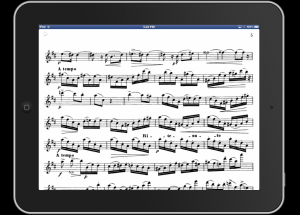The world of classical music is all about tradition. But after seeing a musician on youtube present a concert using an Ipad instead of sheet music, it got me to wonder if he wasn’t on to something. Could technology like this could potentially become commonplace in the concert hall?
We have all seen the notorious page turner perch themselves at the shoulder of a pianist curing a concert, and every once in a while awkwardly reach over to turn their pages for them. It’s a thankless job, and having done it myself once, is surprisingly nerve wracking!
But if I can play Jonny Carson for a moment and try my hand at predicting the future, I’d say the personal tablet just might become a significant part of how performers read music during a rehearsal or concert. Here’s why:
For musicians an iPad has three advantages over regular paper scores: cost, portability and, accessibility. Though iPads themselves don’t come cheap, the availability of music for them is. Through an app called Padrucci, musicians can access more than 100,000 scores users have uploaded to the wiki site: International Music Score Library Project (IMSLP). The site scores will appear on your iPad with just a click of a button, and all for free.
As for portability, there is no doubt a device the size of a sheet of paper that weighs less than a book is a convenient option. Musicians can even scan in their own paper scores and house them as a virtual music library. iPads are also self-lit, which enables them to be used in very low light conditions.
As for page turning, musicians can easily use their finger to swipe the pages, or they can use a bluetooth-based external pedal, such as AirTurn or PageFlip, to turn pages hands free.
Below, a performance of Chopin’s Prelude in E minor, with an iPad.
Michael Vincent
